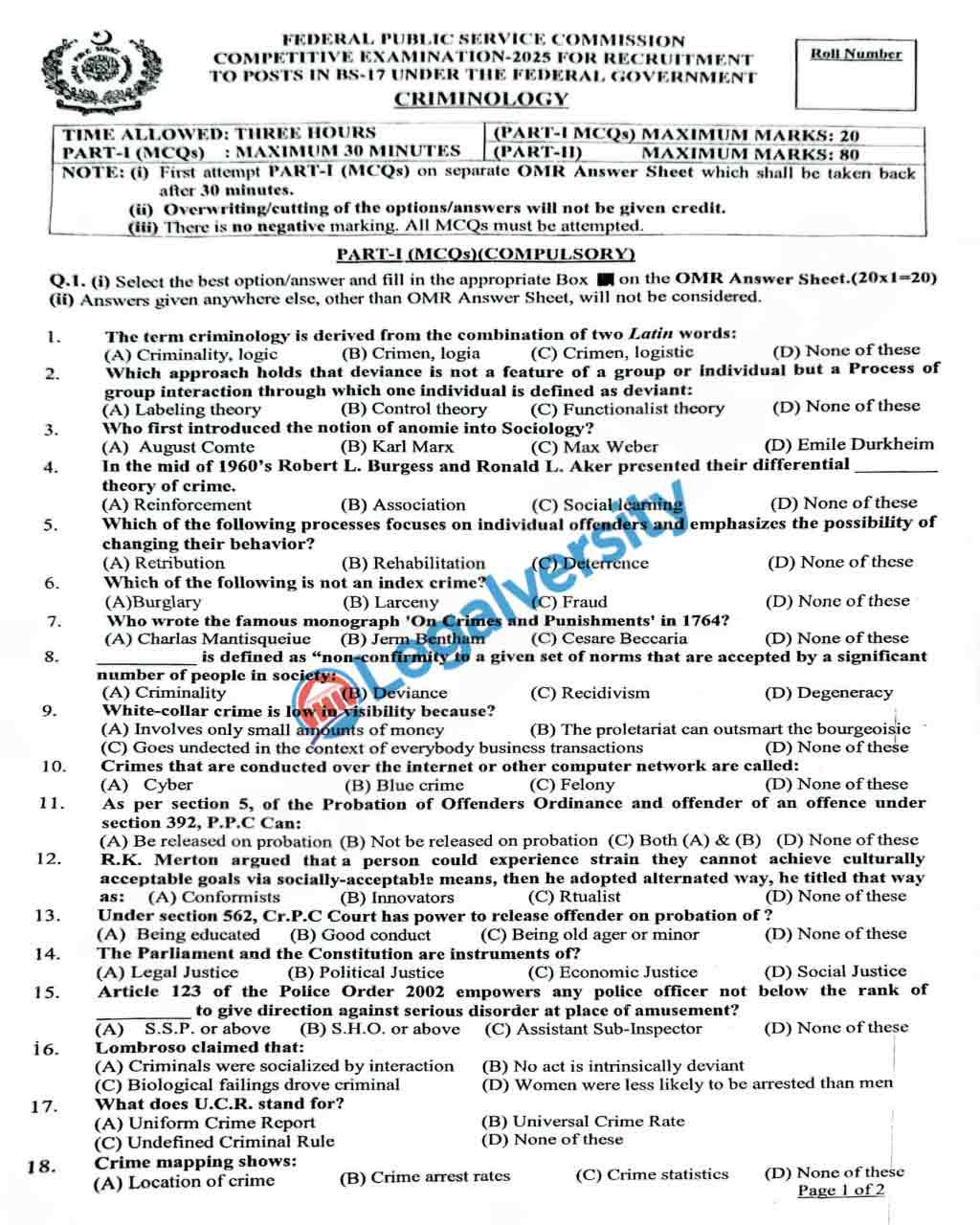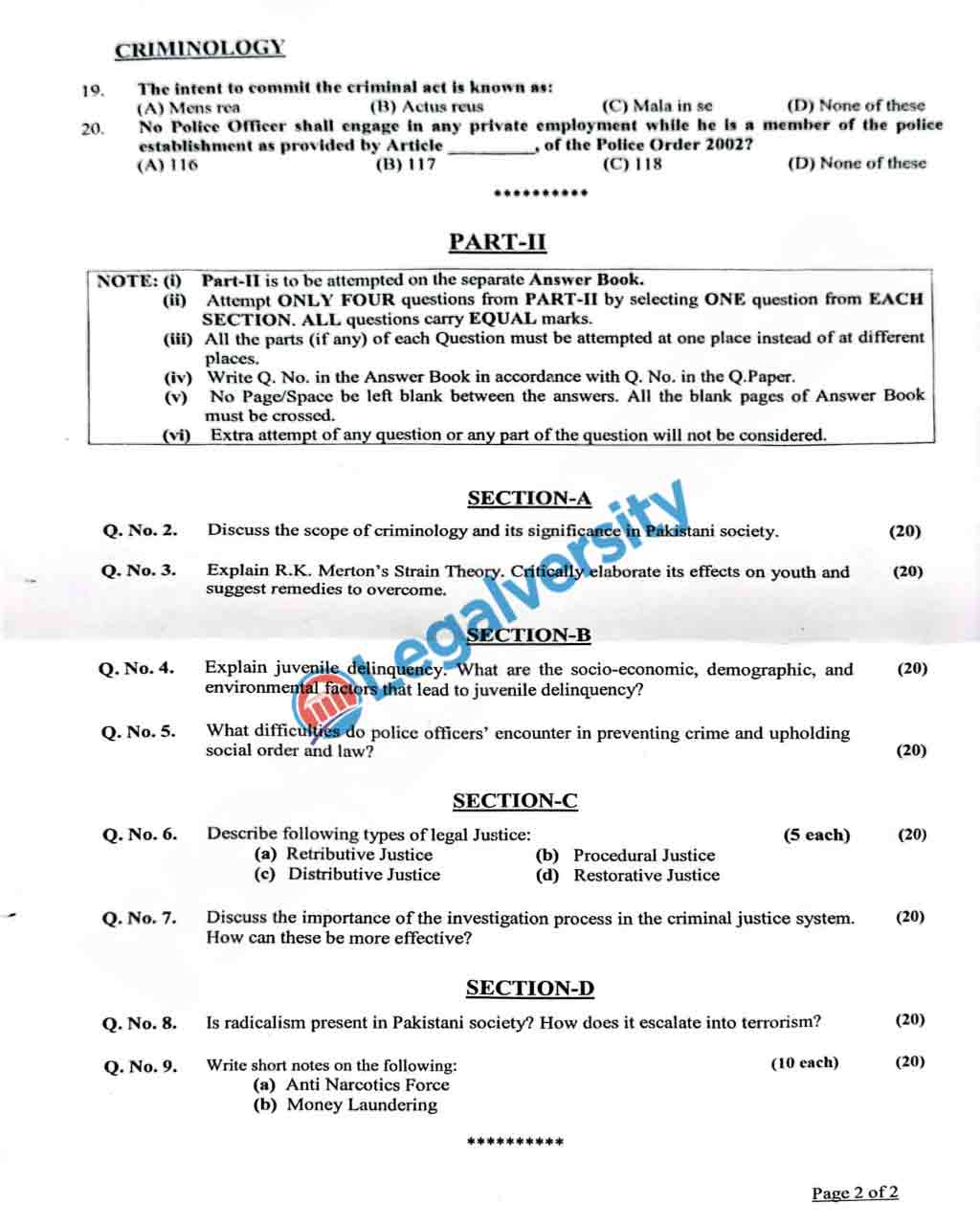The paper on Criminology is optional in the CSS competitive examination 2025. Here, you will find the CSS Criminology past Paper 2025. To give you a proper understanding of the paper I will also provide you a critical evaluation of this paper.
CSS Criminology Past Paper 2025
SECTION-A
Q1. Discuss the scope of criminology and its significance in Pakistani Society.
Q2. Explain R.K. Merton’s Strain Theory. Critically elaborate its effects on youth and suggest remedies to overcome.
SECTION-B
Q3. Explain juvenile delinquency. What are the socio-economic, demographic, and environmental factors that lead to juvenile delinquency?
Q4. What difficulties do police officers encounter in preventing crime and upholding social order and law?
SECTION-C
Q5. Describe the following types of legal justice:
- Retributive justice
- Procedural justice
- Distributive justice
- Restorative justice
Q6. Discuss the importance of the investigation process in the criminal justice system. How can these be more effective?
SECTION-D
Q7. Is radicalism present in Pakistani Society? How does it escalate into terrorism?
Q8. Write short notes on the following:
- Anti Narcotics Force
- Money Laundering
Critical Analysis of the Paper
This Criminology essay is well-organized, discussing basic theories, socio-legal problems, law enforcement issues, and the justice system in Pakistan’s context. It requires a thorough knowledge of criminological concepts and their real-world application in society.
Question one touches upon the breadth of criminology, and the candidate must explain its interdisciplinary context—covering sociology, psychology, law, and forensics. The candidate should argue why criminology is essential in Pakistan, especially in tackling increased crime rates, organized crime, terrorism, and the inefficiency of law enforcement. A good answer should relate criminological theories to Pakistan’s issues, including economic inequality, political instability, and inefficiencies of the legal system.
The second question is about R.K. Merton’s Strain Theory, which describes how societal pressures to succeed can drive individuals, especially youth, towards deviant behavior. The impact on Pakistani youth is immense because of limited economic opportunities, unemployment, and social inequality. A critical analysis should address how limited access to education, corruption, and societal expectations lead to crime. Solutions should involve policy reforms, youth employment schemes, and social awareness campaigns.
The third question tests juvenile delinquency, and one should analyze social, economic, demographic, and environmental factors. One is expected to comment on poverty, ignorance, peer influence, dysfunctional families, and urbanization as key drivers. One should name Pakistan’s juvenile justice system, rehabilitation strategies, and deficiencies in legal protection for children in a strong answer.
The fourth question covers the police officers’ difficulties in preventing crimes and ensuring law and order. The respondents need to bring to the limelight corruption, political meddling, absence of training, antiquated technology, and a dearth of resources. Apart from these, matters such as public distrust, weak prosecution, and inefficient judiciary also need to be covered. There needs to be a critical discussion about reforms that are likely to emerge, including community policing, enhanced forensic strength, and independent monitoring systems.
The fifth question addresses four forms of legal justice:
- Retributive Justice – Punishment-centered, with a concern for deterrence and proportional reaction to crime.
- Procedural Justice – Just and open legal proceedings to provide due process rights.
- Distributive Justice – Fair distribution of resources and opportunities within society.
- Restorative Justice – Rehabilitation and reconciliation of offenders and victims.
The sixth question is incomplete, but it likely pertains to either criminal justice models or crime prevention strategies. If it concerns criminal justice models, candidates should discuss crime control vs. due process models and their effectiveness in Pakistan. If it relates to crime prevention, responses should cover community policing, stricter legislation, and judicial reforms.
The seventh question focuses on Pakistani radicalism in society and its connection with terrorism. The candidates are required to explain political unrest, socio-economic inequality, religious extremism, and foreign interference as causation factors of radicalization. Analysis should cover counter-terrorism strategy, de-radicalization activities, and the role of education and media as tolerance promoters.
The eighth question asks short notes on
- Anti-Narcotics Force (ANF) – Its contribution to fighting drug trafficking, enforcement of drug regulations, and rehabilitation.
- Money Laundering – How it funds terrorism, destabilizes the economy, and results in economic offenses in Pakistan. Candidates should cite Pakistan’s anti-money laundering legislation and FATF (Financial Action Task Force) compliance issues.
Final Assessment
This essay needs a sound theoretical background, practicality, and critical thinking. The candidates need to apply criminological principles to Pakistan’s actual problems, using legal principles, statistical patterns, and policy suggestions. A well-organized response will contain background, relevance to the present, and reformative proposals.
View the CSS Criminology past paper 2025


You can also visit the CSS Notes, all CSS previous papers, and study material for Criminology as well.
